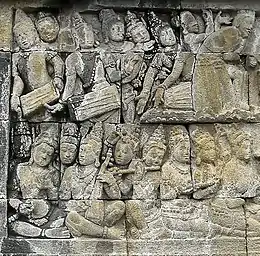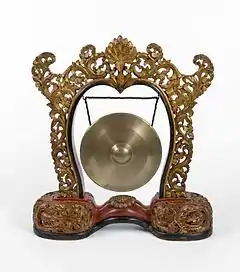Gamelan degung
Gamelan degung is a Sundanese musical ensemble that uses a subset of modified gamelan instruments with a particular mode of pelog scale. The instruments are manufactured under local conditions in towns in West Java such as Bogor.[1] Degung music is often played at public gatherings in West Java, such as at local elections, as well as many other events.[2] There is international interest in degung as well among communities in other countries interested in Indonesia and gamelan music.[3]
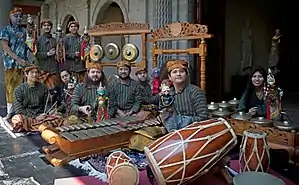 A gamelan degung player | |
| Developed | Indonesia |
|---|---|
| Music of Indonesia | |
|---|---|
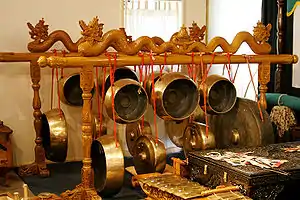 | |
| Genres | |
| |
| Specific forms | |
| |
| Regional music | |
Instruments
The instrumentation of gamelan degung is quite flexible. It may include:
- Bonang/kolènang: two rows of seven small bulbous gongs. It differs from its Javanese counterpart in that the rows are each placed on either side of the player.
- Saron/peking: a high-pitched bronze metallophone with fourteen keys.
- Panerus: another bronze metallophone, similar to the peking but pitched an octave lower.
- Jengglong: six bulbous gongs suspended from the same frame.
- Goong ageung: a large gong.
- A set of kendang, consisting of one large and two small double-sided drums.
- Suling degung: a four-holed bamboo flute.
- Gambang: a wooden xylophone.
In classical degung, the bonang serves as a conductor for the whole ensemble. Except in certain modern compositions, it is rarely absent.
Gallery
 Closeup of a bonang from gamelan degung
Closeup of a bonang from gamelan degung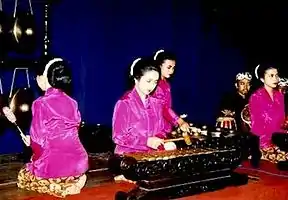 Sundanese gamelan degung
Sundanese gamelan degung Sundanese students playing gamelan degung on the street
Sundanese students playing gamelan degung on the street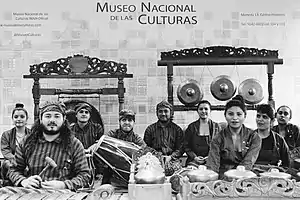 Gamelan degung performed by Indra Swara in Mexico
Gamelan degung performed by Indra Swara in Mexico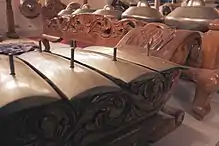 Gamelan degung instruments
Gamelan degung instruments
References
- Retno K. Djojo, "For the love of music", The Jakarta Post, 29 January 2010.
- Theresia Sufa, "Sundanese music and dance liven election day in Bogor", The Jakarta Post, 26 October 2008.
- Dewi Anggraeni, "Melbourne: Gamelan, elephants and 'Jackpot'", Archived 2015-04-02 at the Wayback Machine, The Jakarta Post, 22 February 2004.
This article is issued from Wikipedia. The text is licensed under Creative Commons - Attribution - Sharealike. Additional terms may apply for the media files.
